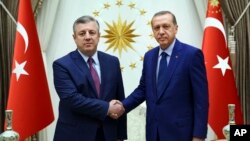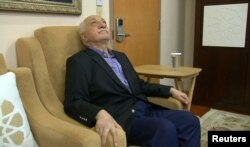Turkey's president has declared a three month state of emergency following last week's attempted coup.
President Recep Tayyip Erdogan issued the declaration in a televised address on Wednesday, after a cabinet meeting on stabilizing the country.
Earlier, Turkish state media reported authorities are acting to close down 626 private schools and other educational establishments, in the latest step of a crackdown after last week's attempted coup.
The schools are linked to exiled cleric Fethullah Gulen, who set up a network of schools across Turkey to promote his teachings.
Also Wednesday, Turkey's higher education council announced a ban on academics traveling abroad and urged all of those currently abroad to return home quickly.
In addition, Turkey has banned academics from leaving the country and urged those traveling abroad to return home.
Turkish media reported that the education ministry fired 15,200 teachers across the country, while the interior ministry dismissed nearly 9,000 workers. Another 1,500 in the finance ministry were fired, as were hundreds more in the religious affairs directorate, the family and social policy ministry and prime minister's office. The country's higher education board demanded the resignations of 1,577 university deans.
The firings came in addition to about 9,000 people Ankara has detained for suspected involvement in the attempted overthrow of President Erdogan's government.
US offers investigation assistance
U.S. President Barack Obama has offered to aid in the investigation of last week's attempted coup.
The White House said Obama and Erdogan spoke by telephone on Tuesday. Obama made clear that the United States will "provide appropriate assistance" to the investigation.
The two men also discussed Turkey's request that Muslim cleric Fethullah Gulen be extradited from the U.S. to face charges that he was linked to the coup attempt. A White House spokesman did not give details about the U.S. position on Gulen's possible extradition, except to say the decision will be made according to a longstanding treaty between Ankara and Washington.
In his phone call with Erdogan, Obama strongly condemned the coup attempt and urged that investigations and prosecutions related to the uprising be conducted in ways that reinforce public confidence in democratic institutions and the rule of law, according to the White House.
In another telephone call Tuesday , U.S. Secretary of Defense Ash Carter spoke with Turkish Minister of Defense Fikri Işik. The Turkish official assured Carter that Turkey remains a determined and committed partner and ally in the fight against terrorism.
Işik had planned to attend a ministerial meeting that Carter is hosting Wednesday in Washington on countering Islamic State, but now says he must remain in Turkey.
Request for Gulen's extradition
Turkey has sent files to the U.S. on Gulen, who has lived in the United States since 1999. In Washington, the State Department confirmed that Washington did receive some “materials” from Ankara, but that it is working with the Justice Department to review and analyze “whether they constitute a formal extradition request.”
Gulen lives in Pennsylvania on the grounds of the Golden Generation Worship & Retreat Center, an Islamic facility founded by Turkish Americans. His philosophy mixes a mystical form of Islam with staunch advocacy of democracy, education, science and interfaith dialogue. His movement operates dozens of charter schools in the U.S.
Gulen continues to exert considerable influence in Turkey, with supporters in the media, police and judiciary.
Erdogan and Gulen were once allies, but had a falling out over 2013 corruption investigations in Turkey, which the Turkish leader blamed on Gulen.
The exiled Gulen has also criticized Erdogan's increasingly authoritarian rule, while the Turkish leader has carried out a broad campaign against Gulen's movement.
Erdogan said Sunday he is receptive to reinstating the country's death penalty in the aftermath of the coup attempt.But EU foreign policy chief Federica Mogherini warned that such a step may end Turkey's EU membership hopes.
"Let me be very clear," she said. "No country can become an EU state if it introduces the death penalty."
Turkey hasn't executed anyone since 1984, and capital punishment was legally abolished in 2004 as part of Turkey's bid to join the European Union.
State Department correspondent Nike Ching and London correspondent Luis Ramirez contributed to this report.







